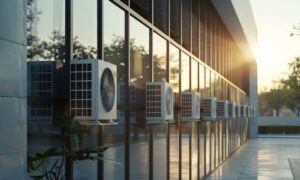A well-maintained HVAC system is crucial for home comfort and energy efficiency. However, over time, systems can deteriorate, leading to decreased performance and increased costs. Here are some signs that your HVAC system might need attention:
- Inefficient Cooling or Heating: If your system struggles to maintain comfortable temperatures, it might be time for repairs or HVAC replacement.
- Unusual Noises: Loud, grinding, or rattling sounds can indicate internal issues.
- Frequent Breakdowns: Repeated repairs might signal the end of your system’s lifespan.
- Increased Energy Bills: A sudden spike in energy costs could be a sign of reduced efficiency.
- Age of the System: HVAC systems typically last 10-15 years. Older units might be less efficient and prone to breakdowns.
- Poor Indoor Air Quality: If you notice unusual odors, humidity issues, or discomfort, it could be time for HVAC replacement.
- Weak Airflow: It might be caused by filter blockages, ducting difficulties, or system failures.
If you experience multiple of these signs, it’s advisable to consult with a professional HVAC company to assess the situation and recommend the best course of action.
Understanding the Signs of an Aging HVAC System
While many issues can be resolved with repairs, there are instances when replacing your HVAC system becomes necessary. Here are key indicators of an aging system:
- Frequent Repairs: If you call in technicians from a professional HVAC company regularly, it might be more cost-effective to replace the system.
- Age of the System: Most HVAC systems have a lifespan of 10-15 years. If your system is nearing this age, it’s likely less efficient.
- Increased Energy Bills: A significant rise in energy costs despite regular maintenance could signal inefficiency.
- Poor Indoor Air Quality: An old system might struggle to filter pollutants effectively.
- Inconsistent Heating or Cooling: Difficulty maintaining comfortable temperatures throughout your home.
Benefits of Upgrading to a New HVAC System
Upgrading your HVAC system can offer numerous advantages beyond simply resolving existing issues. Here are some key benefits:
- Improved Energy Efficiency: Newer models are significantly more energy-efficient, leading to lower utility bills.
- Enhanced Comfort: Modern systems often offer features like zoned climate control and better humidity management.
- Quieter Operation: Newer HVAC systems are designed to operate more quietly, reducing noise disturbances.
- Improved Air Quality: Many new systems include advanced filtration systems to enhance indoor air quality.
- Increased Home Value: A modern HVAC system can boost your home’s value.
- Potential Rebates and Tax Credits: Check for local incentives to offset the cost of a new system.
By investing in a modern HVAC system, you can enjoy more comfort, cheaper energy bills, and a healthier indoor environment. If you’re experiencing multiple of these issues, it’s time to consider a HVAC replacement. New HVAC systems offer improved efficiency, quieter operation, and often come with warranties.



































